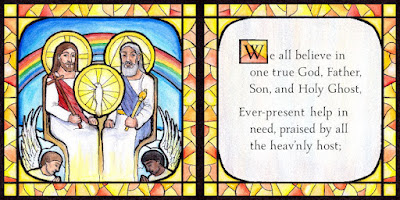The goal of Nicaea was not to preserve merely a philosophical expression of what is right belief but to ensure right worship. The adoption of the creed was then only part of its solution. They developed the creed both to summarize the basic beliefs of orthodox Christianity as revealed in Scripture and to condemn any other beliefs. It was not some ethereal or picky unpacking of the relationship of the Father to the Son but the preservation of right worship by maintaining boundaries of right belief. Salvation is found in no other God than this God whom the creed confesses. Everything else is excluded. Whether Arius or not, anything else cannot be the true God nor can the worship be true worship. These boundary lines were not simply for the sake of belief but directly practical to worship.
Interestingly, Luther has not much to say about the Nicene Creed. That is because it was not in dispute. The errors were not Trinitarian. The right God was being worshiped but not with the right worship (sacrificial vs sacramental). To those who insist that simple agreement on the Nicene Creed is or ought to be sufficient for church fellowship (altar fellowship), remember that the principle is the same. Other doctrines were not in dispute but the core or central doctrine of who God is was disputed in the early church and more extensive creedal statements might have been adopted had they been. Luther's chief contribution here is to put the creed into singable form so that it might be more easily memorized and confessed in the catechetical hymn Wir glauben all an einen Gott.
So the question remains. What ought to be the proper boundaries for worship? Here the standard of Nicea remains as it has for nearly 1700 years. From the sixth century down through the present, the creed insists that right worship must worship the right God. As unequivocal as this is, it is not exhaustive. Where other doctrines or truths are denied, other mechanisms must be employed as boundaries against those who believe falsely and therefore do not worship rightly. The Athanasian Creed makes this painfully true -- whoever would be saved must confess that catholic faith. This is not some bare essential of Trinitarian economy but that which has always been believed everywhere. Oddly enough, our problems today are not in the fringes of belief but remain in the core. Who God is remains a current issue. In a world where significant numbers of people within orthodox Trinitarian churches are still confessing that Jesus is not God, was not incarnate of the Virgin Mary by the Holy Spirit, and did not die in atonement for the sins of the whole world and rise for the sake of those for whom He died. All of this is connected. Confess the right God and confess rightly that this God works through one baptism for the forgiveness of sins. Nobody but a fool would say that this right belief is inseparable from right worship but no one but a fool would also insist that this is all that need be believed.

1 comment:
I like what you said: “Proper worship requires proper belief.” It is also true that anything less means we are not worshipping God in spirit and truth, but have succumbed to a god that fits into our own imagination.
Post a Comment